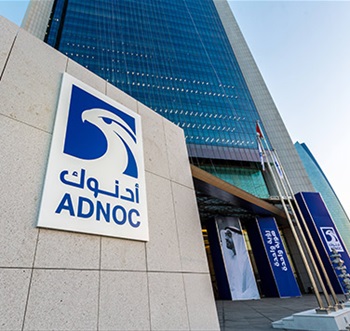Black Rock, KKR Land $4 Billion Pipeline Deal with UAE’s ADNOC
ABU DHABI (Reuters) – Abu Dhabi National Oil Company (ADNOC) has sealed a $4 billion midstream pipeline infrastructure deal with U.S. investment firms KKR and BlackRock, the government-owned company said.
ADNOC has been expanding through strategic partnerships since 2017. Last month it won a combined $5.8 billion investment from Italy’s Eni and Austria’s OMV for a stake in its refining business to establish a new trading operation owned by the three partners.

The latest deal, announced Sunday, follows ADNOC’s capital markets debut with its Abu Dhabi Crude Oil Pipeline bond, the IPO of ADNOC Distribution and other initiatives.
A new entity called ADNOC Oil Pipelines will lease the oil company’s interest in 18 pipelines, transporting crude oil and condensates across ADNOC’s upstream concessions for a 23-year period, ADNOC said in a statement.
The 18 pipelines have a total length of over 465 miles (750 km) and capacity of 13 MMbpd.
Funds managed by KKR and BlackRock will form a consortium to hold a 40% stake in the entity, with ADNOC owning the rest. ADNOC will have sovereignty over the pipelines and management of pipeline operations.
The deal, expected to close in the third quarter of 2019, will result in upfront proceeds of some $4 billion to ADNOC.
The statement cited Sultan al-Jaber, ADNOC group CEO, as saying the deal validated ADNOC’s approach of “unlocking value from its portfolio of assets while retaining control over their ownership and operation.”
BlackRock is investing through its Global Energy & Power Infrastructure Fund series while KKR’s investment is through its third Global Infrastructure Investors Fund, the statement said.
“We believe that today’s agreement among ADNOC, BlackRock and KKR will be followed by many more such partnerships to invest in the future growth of the region,” said BlackRock CEO Laurence Fink.
This is KKR’s first direct investment in the region, co-CEO Henry Kravis said, adding that there is substantial potential for more.
ADNOC has undergone major changes since al-Jaber’s appointment in 2016, embarking on privatization, oil trading and expanded partnerships with strategic investors.
“I think the approach taken here by ADNOC reflects a desire to monetize assets they have under their control,” said Edward Bell, director of commodities research at Emirates NBD. “So, I think it reflects an attempt to realize the value of the infrastructure they have in place more than a strategic shift into midstream oil and gas.”
ADNOC produces about 3 MMbpd of oil and 10.5 Bcf/d of raw gas.
Related News
Related News

- Keystone Oil Pipeline Resumes Operations After Temporary Shutdown
- Biden Administration Buys Oil for Emergency Reserve Above Target Price
- Freeport LNG Plant Runs Near Zero Consumption for Fifth Day
- Enbridge to Invest $500 Million in Pipeline Assets, Including Expansion of 850-Mile Gray Oak Pipeline
- Williams Delays Louisiana Pipeline Project Amid Dispute with Competitor Energy Transfer
- Evacuation Technologies to Reduce Methane Releases During Pigging
- Editor’s Notebook: Nord Stream’s $20 Billion Question
- Enbridge Receives Approval to Begin Service on Louisiana Venice Gas Pipeline Project
- Mexico Seizes Air Liquide's Hydrogen Plant at Pemex Refinery
- Russian LNG Unfazed By U.S. Sanctions




Comments